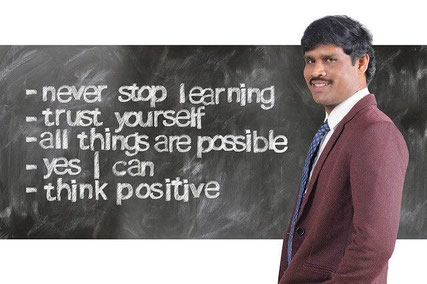
People often make the mistake of thinking that good mental health is all about positive thinking. However, an excessive emphasis on positive thinking can be dangerous, as America discovered under the leadership of Donald Trump.
Now, many readers might not associate Trump with positive thinking. The name-calling, the insults, the bullying – Trump’s tactics could be very negative indeed.
However, when it came to managing Covid-19, Trump often displayed delusional levels of positivity. ‘It's going to disappear one day’, he said at the end of February. ‘It’s like a miracle’. As the year progressed, Trump repeated that the virus would magically ‘go away’ on multiple occasions. ‘I don’t want to be a negative person’, he said. ‘I’m a cheerleader for this country …I’m not about bad news.’
NORMAN VINCENT PEALE
Of course, warning Americans of the dangers ahead would not have been ‘negative’; it would have been realistic and responsible. It’s all very well to see the glass as half-full rather than half-empty, but some people like to pretend that the glass is completely full. This is certainly the case with Trump, who was influenced by the teachings of Reverend Norman Vincent Peale. Peale, the author of the best-selling book The Power of Positive Thinking, was ‘the greatest speaker I think I’ve ever witnessed’, Trump once said, and even performed the nuptials at Trump’s first wedding.
The problem is excessively positive thinking can morph into magical thinking and blind you to reality. In the late 1980s, Trump was warned by multiple people that his ambitious plans for the Trump Taj Mahal casino in Atlantic City were too risky. He ended an interview with one interviewer who referred to widespread analyst doubts, complaining that the interviewer was a ‘very negative guy’ who only wanted ‘to talk about the negative’. A year later, the Trump Taj Mahal went bankrupt. However, his thinking remained unchanged. Reflecting on those times many years later, he said he ‘refused to be sucked into negative thinking on any level, even when the indications weren't great’.
This denial of reality can also be seen in Trump’s attitude towards his wealth. He once sued a journalist who questioned the extent of his wealth. Asked in court to estimate his net worth, Trump said it ‘goes up and down’ based on a number of factors, including ‘my own feelings’ and ‘my general attitude at the time that the question may be asked.’
Of course, your feelings have nothing to do with your net worth; I could say that I “feel” that I am a multi-millionaire, but that wouldn’t make it true.
THE SECRET

Magical thinking is the idea that your thoughts or wishes can somehow influence the external world, that everything will turn out the way you want it to be if you just think positively. It’s at the heart of another bestselling book, Rhonda Byrne’s The Secret. ‘Food cannot cause you to put on weight, unless you think it can’, she writes. ‘Food is not responsible for putting on weight. It is your thought that food is responsible for putting on weight that actually has food put on weight.’ If you think 'perfect thoughts', she adds, ‘the result must be perfect weight’.
Well, no – If I eat an entire chocolate cake and follow it up with a tub of ice cream, then I’m going to put on weight, no matter what kind of pretty thoughts I think.
Similarly, the book advertised itself using the line ‘Everything is possible, nothing is impossible’, which prompted this response from psychologist and CBT expert Prof. Robert Leahy. ‘How wonderful to know that we can count on the power of our thinking to change the laws of nature. Gee, I wonder if just thinking positively will overcome the law of gravity. Any volunteers? No? Hmm. Sounds both absurd – and rather dangerous to me’.
It’s important to be able to honestly acknowledge negative feelings and problematic situations. Pretending that things are great when problems are mounting is not a good idea. Aim to be a balanced thinker, and remember that overly positive thinking can be just as distorted as overly negative thinking.
(First published in Southern Star, 25/11/2020).